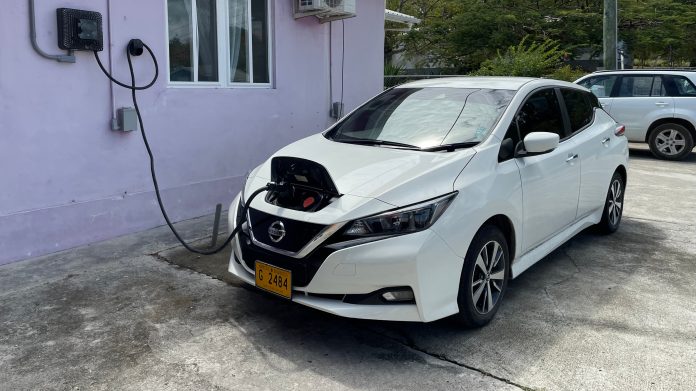
By Orville Williams
In a display of the potential benefits of green energy applications, the Victory Center school will soon be powered by an electric vehicle, as part of sensitisation efforts driven by the Department of Environment (DoE).
A visit to the Nugent Avenue facility will show a Nissan Leaf – touted as one of the most reliable all-electric vehicles on the market – plugged into the side of the building.
Chief Environment Officer, Ambassador Diann Black-Layne, explained that this initiative is part of the DoE’s wider plan to boost the energy resilience of schools across the country.
“Similar to most of the projects that we’re doing at the Department of Environment, we want to make sure that all schools can be up and running within three days of a hurricane. That’s our target,” she told yesterday’s Observer AM show.
“By 2025, almost all schools will have renewable energy systems that will not only run the school, providing electricity to them during the days using solar, but they will also provide the backup energy systems that [the schools] would need,” she said.
One of the biggest challenges that environmentalists often face is convincing persons that the benefits of acquiring green energy applications far outweigh the costs, which are considerably high in some instances.
Addressing this issue, Black-Layne noted that manufacturers are becoming increasingly aware of those apprehensions and are making electric vehicles more multifaceted as a result.
“In today’s world of saving money and becoming more efficient…these new technology providers and young people designing these vehicles realise that [people] want a car to be more than a car, just like your phone is more than a phone.
“So, you can use that car to run your business. If you’re a contractor, instead of having a generator – in some vehicles, not all – you can use your car and plug your equipment into the car,” she explained.
And speaking of high costs, the Ambassador added that it is appearing more cost-effective to purchase an electric vehicle to generate power, than it is to buy the batteries usually used to power buildings.
“Batteries are very expensive, so instead of buying a battery for a school that sits there all night, you can actually buy a car with the battery and let the car [power] the school. It’s almost the same price,” Black-Layne continued.
“So, if you wanted to buy good batteries for your home, let’s say the Tesla batteries – and you’ll need about three of them – that’s about USD$30,000. That’s the same price as a car and the battery capacity of your car will be more than the three Tesla batteries in your home.
“[For example] if the Victory Center runs out of energy, one of the teachers could have a car and that car could run the school. You won’t have to drive a battery in the back of a pickup truck or get a generator; you just drive in a car, plug in the school and, afterward, just drive the car away.”
The resilience-building initiative will not be restricted to just schools, based on word from Vekash Khan, Technical Officer in the DoE.
He told Observer that, “the whole point is including these bidirectional chargers in essential buildings like shelters, just to ensure that the downtime for these buildings is reduced”.
“So in the case of a hurricane or other emergency event, whereas they would’ve had to look at a fossil fuel-based diesel generator, they can now look at a green-based electric vehicle to power their buildings,” he added.
The initiative, according to Pamela MacDougall, Senior Manager for Grid Modernization with the Environmental Defense Fund (EDF), forms part of the body’s efforts to examine the use of electric vehicles to power buildings in the event of hurricanes and to support communities that are most frequently affected.
“I think [projects like this] are important because they’re combining two sectors that need to transition rapidly and also because they provide solutions to communities that are heavily impacted by climate change,” she added.
The Victory Center was chosen as the site for the pilot project, as it is both a school for special needs students and serves as a shelter during emergencies.
